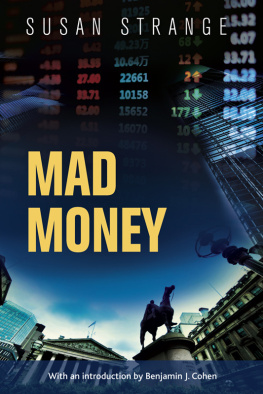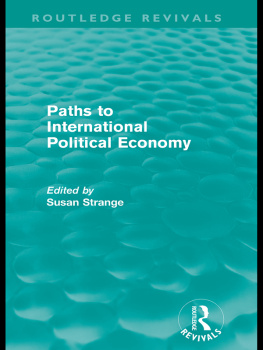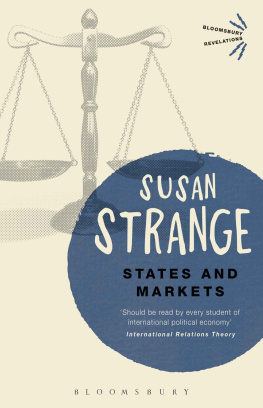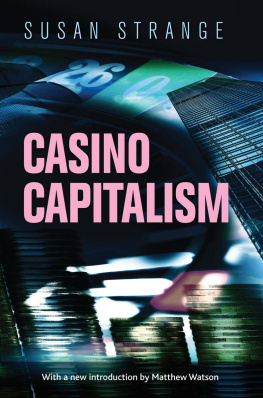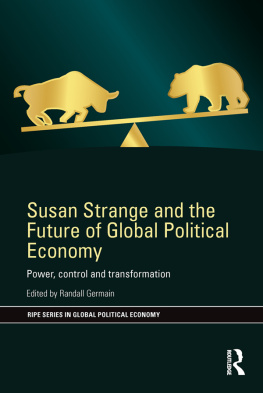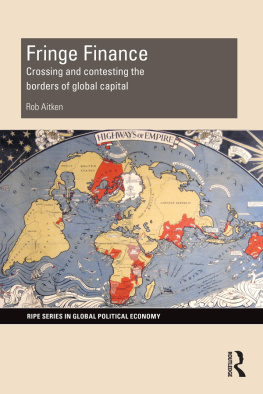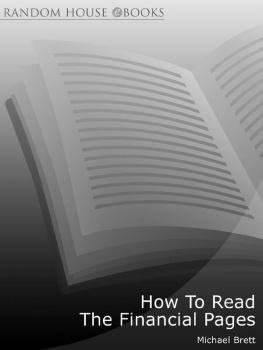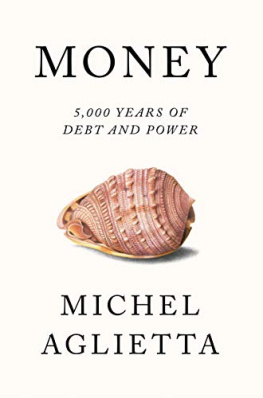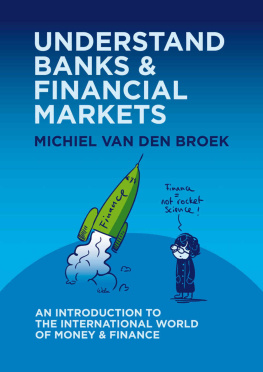Benjamin J. Cohen
No one doubts the monumental role that Susan Strange played in the development of the modern field of International Political Economy (IPE). Starting in the 1960s, her work inspired generations of scholars to create a distinctive and remarkably robust British school of IPE. At the centre of her professional oeuvre was a fascination with the connections between money and politics, starting with her first book, Sterling and British Policy (1971), and continuing with such memorable volumes as Casino Capitalism (1986) and States and Markets ([1988] 1994). Fittingly, it was also the subject of her last book, Mad Money (1998), published just before her life was tragically cut short. The politics of money, it is safe to say, was never far from her thoughts.
Key themes
Not surprisingly, some of Stranges thinking about money showed significant change over time, reflecting the evolution of real-world events as well as her own steep learning curve. Most noticeable was her gradual shift from the state-centric perspective of her early work to a greater emphasis on non-state actors, as international capital markets revived and the pace of financial globalisation accelerated. During the 1970s her principal emphasis was on inter-state relations and the diplomacy of monetary negotiations. In this respect she was no different from most other specialists at the time (including myself), who also treated governments as the main actors involved. Market forces, insofar as they were considered at all, entered analysis as little more than a vexing constraint or complication for policy makers. More quickly than most others, however, she came to recognise the fundamental transformation being wrought by the : 1).
In a more fundamental sense, however, her thinking was remarkably consistent, stressing key themes over and over again in a variety of analytical contexts. Four themes, in particular, stand out.
First was the inherently political nature of money. No working politician, Strange wrote, needs to be reminded of the political nature of monetary policy Decisions concerning the management of money substantially affect other matters of great political sensitivity (Calleo and Strange : 91).
A second theme, following logically from the first, was the connection of money to power, with the arrow of causation running in both directions. If money was inseparable from politics, so too was the politics of money inseparable from considerations of power particularly at the international level, where relationships between states are ultimately decided by relative power (Strange : 39, emphasis added). Power was both the cause and the effect of monetary outcomes.
In Sterling and British Policy, for example, Strange distinguished four types of international currency: Top Currencies, Master Currencies, Negotiated Currencies and Neutral Currencies (Strange : 99).
A third theme, in turn, concerned the general world balance that she spoke of and what it might look like. Strange assumed that the distribution of power in monetary affairs would almost certainly be highly asymmetric, with a small number of states enjoying a disproportionately large share of influence. For her, there was no doubting the reality of the inequality of power (Strange : 23).
Hierarchy was an obvious feature of her early analysis of international currencies (Strange : 43). Hierarchy implied privilege in her view, but also a measure of responsibility.
A final theme involved the United States, my own country, which Strange always regarded with a jaundiced mix of admiration and resentment. America, she insisted, was clearly primus inter pares, even within the affluent alliance and even where others perceived hegemonic decline. The US dollar was Top Currency the choice of the market (Strange : 266).
But for Strange there was a problem the fact that America too often acts in exactly the opposite way to that of a responsible hegemon (Strange [1988] : 358). Strange did not exactly hate us Yanks, but she did find our behaviour a bit intolerable at times.

